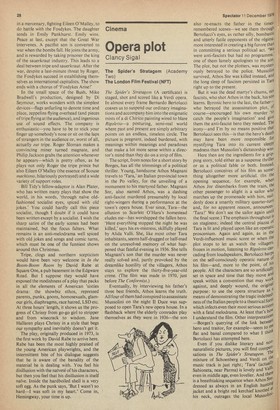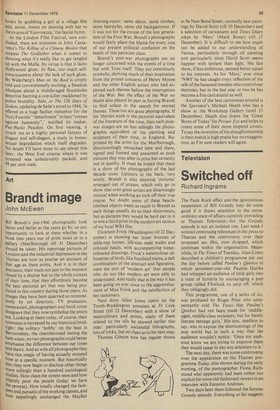Opera plot
Clancy Sigal
The Spider's Stratagem (Academy Two) The London Film Festival (NFT)
The Spider's Stratagem (A certificate) is staged, shot and scored like a Verdi opera. In almost every frame Bernardo Bertolucci coaxes us to suspend our ordinary imaginations and accompany him into the enigmatic mists of a di Chirico painting wired to blare Rigoletto—a posturing, semi-real world where past and present are simply arbitrary points on an endless, timeless circle. The picture is pregnant, indeed burdened, with meanings within meanings and paradoxes that make a lot more sense within a director's mind than they do on a strip of film.
The script, from notes for a short story by Borges, has all the trimmings of a political thriller. Young, handsome Athos Magnani travels to 'Tara,' an Italian provincial town in the Po valley, for the unveiling of a monument to his martyred father. Magnani Snr, also named Athos, was a dashing anti-fascist murdered presumably by local right-wingers during a performance at the town's opera house. Ever since, Tara—the allusion to Scarlett O'Hara's homestead eludes me—has worshipped the fallen hero. 'Here everything stopped the night he was killed,' says his ex-mistress, skilfully played by Alida Valli. She, like most other Tara inhabitants, seems half-drugged or half-mad on the unresolved memory of what happened that fateful evening in 1936. She tells Magnani's son that the murder was never really solved and, partly provoked by the dreamlike hostility of the villagers, Athos stays to explore the thirty-five-year-old crime. (The film was made in 1970, just before The Conformist.)
Eventually, by interviewing his father's three best friends, Athos learns the truth. All four of them had conspired to assassinate Mussolini on the night II Duce was supposed to open Tara's new opera house. In a flashback where the elderly comrades play themselves as they were in 1936—the son
also re-enacts the father in the times. remembered scenes—we see them through Bertolucci's eyes, as rather silly, bombastic and utterly futile opponents of the regime, more interested in creating a big furore than in committing a serious political act. 'We were anti-fascists but had no programme, one of them lamely apologises to the son. The plot, but not the plotters, was mysteri
ously betrayed to the police. Mussolini survived, Athos Snr was killed instead, and the long sleep of fascism persisted in Tara right up to the present.
But it was the dead martyr's chums, tuit fascists, who shot Athos in the back, his son learns. Byronic hero to the last, the fatherwho betrayed the assassination plot, of
course—encouraged his own murder 't° catch the people's imagination' and give them the anti-fascist hero they needed. The irony—and I'm by no means positive that Bertolucci sees this—is that the hero's death may have been more responsible for mystifying Tara into its current sleePY madness than Mussolini's dictatorship was.
Here then are the ingredients for a grill' ping story, told either as a suspense thriller
or as a political fable or both. Instead, Bertolucci conceives of his film as some"
thing altogether more artificial. (In the opening sequence, for example, when Athos Jnr disembarks from the train, the
other passenger to alight is a sailor wh° marches up the promenade with him, suddenly does a smartly military quarter-turn and, for no apparent reason, announces:
'Tara!' We don't see the sailor again until the final scene.) The emphasis throughout IS
on staginess; indeed the central piazza 01
Tara is lit and played upon like an operatic proscenium. Again and again, as in the
Verdi-influenced music score or when the plot stops to let us watch the villagers, frozen in motion, listening to Rigoletto cading from loudspeakers, Bertolucci harPs on the self-consciously operatic nature 01.
his film—and, more to the point, of his
people. All the characters are so artificiallY set in space and time that they move and
speak within a convention that May worlc.
against, and deeply wound, the original purpose: to use the opera structure as 3
means of demonstrating the tragic indebted"
ness of the Italian people to a theatrical fortn which infects even their most serious actions
with a fatal melodrama. At least that's how
I understand the film. Other interpretations —Borges's querying of the link betweell hero and traitor, for example—seem to ale flat and banal compared to what I thin4 Bertolucci has attempted here. Even if you dislike literary and il011' naturalistic pictures, you will find comPell, sations in The Spider's Stratagem. mixture of Schoenberg and Verdi on the music track is just right; 'Tara' (actuallY Sabioneta, near Parma) is lovely and Valli' even in middle age, even lovelier. And the is a breathtaking sequence when Athos Snr, dressed as always in an English hunting, jacket and a bright red kerchief knotted a,' his neck, outrages the local Mussolini"
lovers by grabbing a girl at a village fete and, alone, insists on dancing with her to the strains of 'Giovinezza,' the fascist hymn.
At the London Film Festival, now concluded, there are moments in John Cassavetes's The Killing 0/a Chinese Bookie that surpass The Godfather when it comes to Showing what it's really like to get tangled Up with the Mafia. Its virtue is that it lacks Hollywood gloss; its flaw, too much selfconsciousness about the lack of such gloss. Bo Widerberg's Man on the Roof is crisply told and conventionally exciting, a Swedish Madigan about a middle-aged Stockholm detective hunting a cop-killer maddened by Police brutality. Salo, or The 120 Days of Sodom, updating de Sade's novel to 1944, 'is offered as a huge Sadian metaphor for the Nazi/ Fascists'"detachment" in their "crimes against humanity"; testified its maker, Pier-Paolo Pasolini. On first viewing, it struck me as a highly personal fantasy of disgust and self-disgust, a study in homosexual degradation which itself degrades. No doubt I'll have more to say about this later; the West End cinema where it was screened was unbelievably packed, and 99 per cent male.



































 Previous page
Previous page